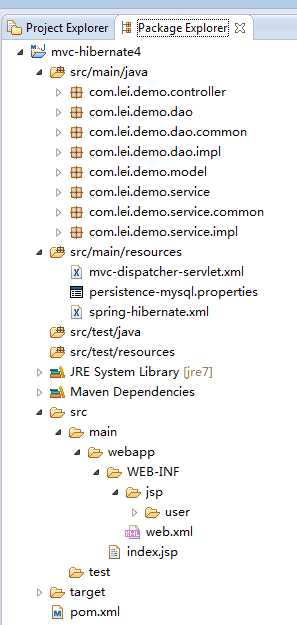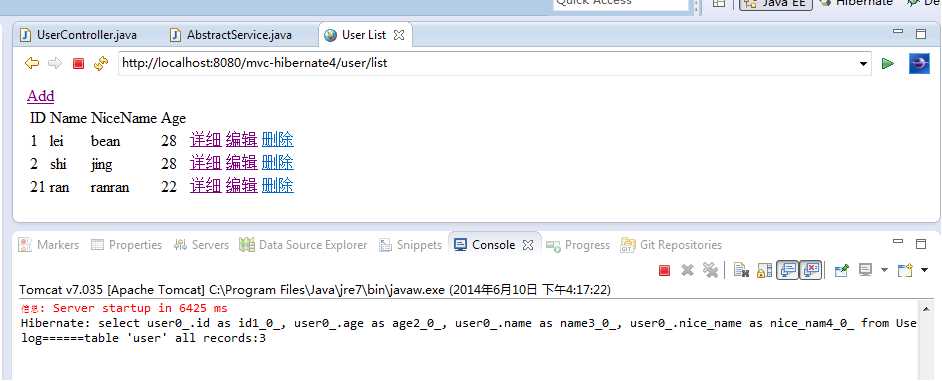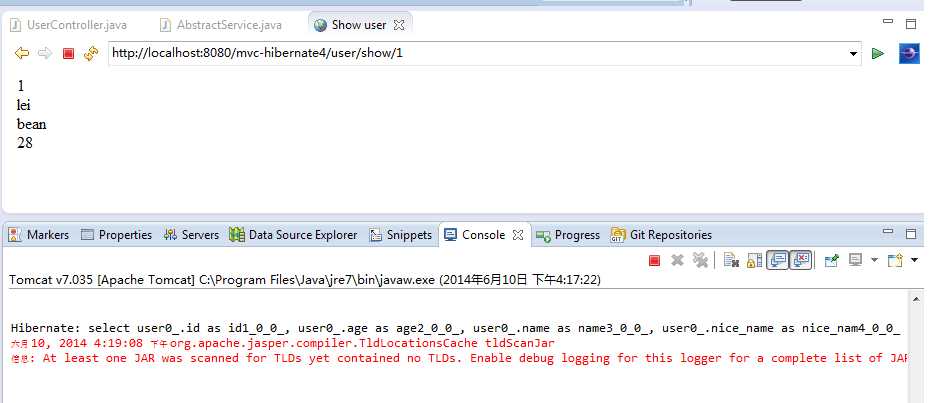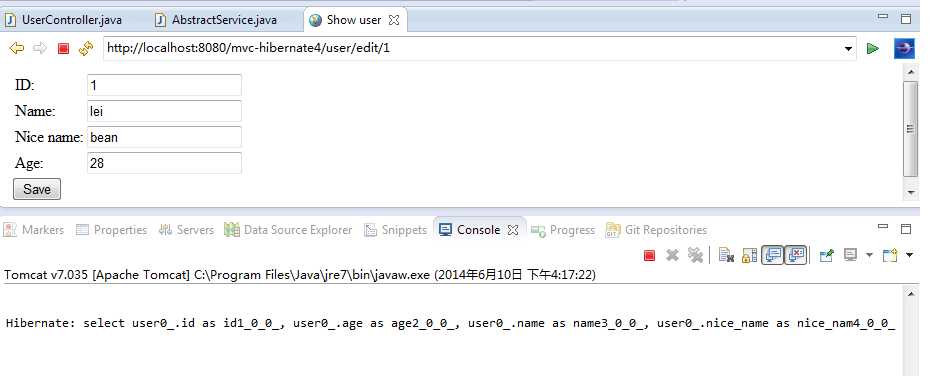Hibernate4集成 Annotation使用教程
Posted
tags:
篇首语:本文由小常识网(cha138.com)小编为大家整理,主要介绍了Hibernate4集成 Annotation使用教程相关的知识,希望对你有一定的参考价值。
Spring4 MVC Hibernate4集成 Annotation
一、 本文所用环境
Spring4.0.3.RELEASE、Hibernate4.3.5.Final、mysql
二、 工程目录

三、 Maven添加依赖
用Maven创建项目,pom.xml如下:
 View Code
View Code
四、 新建数据库表
数据库采用Mysql,新建user表,我们演示操作此表对user进行增删改查
DROP TABLE IF EXISTS `user`; CREATE TABLE `user` ( `id` int(11) NOT NULL AUTO_INCREMENT, `age` int(11) DEFAULT NULL, `nice_name` varchar(32) DEFAULT NULL, `name` varchar(32) DEFAULT NULL, PRIMARY KEY (`id`) ) ENGINE=InnoDB AUTO_INCREMENT=29 DEFAULT CHARSET=utf8;
在model层下,创建Entity类Users.java见下
package com.lei.demo.model;
import java.io.Serializable;
import javax.persistence.Column;
import javax.persistence.Entity;
import javax.persistence.GeneratedValue;
import javax.persistence.GenerationType;
import javax.persistence.Id;
@Entity(name="User")
public class User implements Serializable {
private static final long serialVersionUID = 1L;
public User(){
super();
}
@Id
@GeneratedValue(strategy=GenerationType.AUTO)
@Column(name="id")
private Long id;
@Column(name="name",length=32)
private String name;
@Column(name="age")
private Integer age;
@Column(name="nice_name",length=32)
private String nice_name;
@Override
public String toString() {
return "User [id=" + id + ", user_name=" + name + ", age=" + age
+ ", nice_name=" + nice_name + "]";
}
public final Long getId() {
return id;
}
public final void setId(Long id) {
this.id = id;
}
public final String getName() {
return name;
}
public final void setName(String name) {
this.name = name;
}
public final Integer getAge() {
return age;
}
public final void setAge(Integer age) {
this.age = age;
}
public final String getNice_name() {
return nice_name;
}
public final void setNice_name(String nice_name) {
this.nice_name = nice_name;
}
}
五、 配置文件
1. 首先看一下Web.xml
<?xml version="1.0" encoding="UTF-8"?>
<web-app xmlns:xsi="http://www.w3.org/2001/XMLSchema-instance"
xmlns="http://java.sun.com/xml/ns/javaee"
xmlns:web="http://java.sun.com/xml/ns/javaee"
xsi:schemaLocation="http://java.sun.com/xml/ns/javaee
http://java.sun.com/xml/ns/javaee/web-app_3_0.xsd"
id="WebApp_ID" version="3.0">
<display-name>Archetype Created Web Application</display-name>
<context-param>
<param-name>contextConfigLocation</param-name>
<param-value>classpath:/spring-*.xml</param-value>
</context-param>
<listener>
<listener-class>org.springframework.web.context.ContextLoaderListener</listener-class>
</listener>
<!-- 定义DispatcherServlet -->
<servlet>
<servlet-name>mvc-dispatcher</servlet-name>
<servlet-class>org.springframework.web.servlet.DispatcherServlet</servlet-class>
<init-param>
<!-- 默认/WEB-INF/[servlet名字]-servlet.xml加载上下文,
如果配置了contextConfigLocation参数,
将使用classpath:/mvc-dispatcher-servlet.xml加载上下文
-->
<param-name>contextConfigLocation</param-name>
<param-value>classpath:/mvc-dispatcher-servlet.xml</param-value>
</init-param>
<load-on-startup>1</load-on-startup>
</servlet>
<!-- 拦截匹配的请求,这里所有请求采用名字为mvc-dispatcher的DispatcherServlet处理 -->
<servlet-mapping>
<servlet-name>mvc-dispatcher</servlet-name>
<url-pattern>/</url-pattern>
</servlet-mapping>
</web-app>
2. mvc-dispatcher-servlet.xml
<?xml version="1.0" encoding="UTF-8"?>
<beans xmlns="http://www.springframework.org/schema/beans"
xmlns:context="http://www.springframework.org/schema/context"
xmlns:mvc="http://www.springframework.org/schema/mvc"
xmlns:p="http://www.springframework.org/schema/p"
xmlns:xsi="http://www.w3.org/2001/XMLSchema-instance"
xmlns:tx="http://www.springframework.org/schema/tx"
xsi:schemaLocation="
http://www.springframework.org/schema/beans
http://www.springframework.org/schema/beans/spring-beans-3.0.xsd
http://www.springframework.org/schema/context
http://www.springframework.org/schema/context/spring-context-3.0.xsd
http://www.springframework.org/schema/mvc
http://www.springframework.org/schema/mvc/spring-mvc-3.0.xsd
http://www.springframework.org/schema/tx
http://www.springframework.org/schema/tx/spring-tx-4.0.xsd
">
<!-- 启动自动扫描该包下所有的Bean(例如@Controller) -->
<context:component-scan base-package="com.lei.demo" />
<!-- 基于注释的事务,当注释中发现@Transactional时,使用id为“transactionManager”的事务管理器 -->
<!-- 如果没有设置transaction-manager的值,则spring以缺省默认的事务管理器来处理事务,默认事务管理器为第一个加载的事务管理器 -->
<tx:annotation-driven transaction-manager="transactionManager"/>
<!-- 定义视图解析器 -->
<bean class="org.springframework.web.servlet.view.InternalResourceViewResolver">
<property name="prefix">
<value>/WEB-INF/jsp/</value>
</property>
<property name="suffix">
<value>.jsp</value>
</property>
</bean>
</beans>
3. Spring-hibernate的整合
spring-hibernate.xml文件
<?xml version="1.0" encoding="UTF-8"?>
<beans xmlns="http://www.springframework.org/schema/beans"
xmlns:context="http://www.springframework.org/schema/context"
xmlns:xsi="http://www.w3.org/2001/XMLSchema-instance"
xmlns:tx="http://www.springframework.org/schema/tx"
xmlns:aop="http://www.springframework.org/schema/aop"
xsi:schemaLocation="
http://www.springframework.org/schema/beans
http://www.springframework.org/schema/beans/spring-beans-4.0.xsd
http://www.springframework.org/schema/context
http://www.springframework.org/schema/context/spring-context-4.0.xsd
http://www.springframework.org/schema/aop
http://www.springframework.org/schema/aop/spring-aop-4.0.xsd
http://www.springframework.org/schema/tx
http://www.springframework.org/schema/tx/spring-tx-4.0.xsd
">
<!-- Hibernate4 -->
<!-- 加载资源文件 其中包含变量信息,必须在Spring配置文件的最前面加载,即第一个加载-->
<context:property-placeholder location="classpath:persistence-mysql.properties" />
<bean id="sessionFactory"
class="org.springframework.orm.hibernate4.LocalSessionFactoryBean">
<property name="dataSource" ref="dataSource" />
<property name="packagesToScan">
<list>
<!-- 可以加多个包 -->
<value>com.lei.demo.model</value>
</list>
</property>
<property name="hibernateProperties">
<props>
<prop key="hibernate.dialect">${hibernate.dialect}</prop>
<prop key="hibernate.show_sql">${hibernate.show_sql}</prop>
</props>
</property>
</bean>
<!-- 数据库映射 -->
<bean id="dataSource" class="org.springframework.jdbc.datasource.DriverManagerDataSource">
<property name="driverClassName" value="${jdbc.driverClassName}" />
<property name="url" value="${jdbc.url}" />
<property name="username" value="${jdbc.user}" />
<property name="password" value="${jdbc.pass}" />
</bean>
<!-- 配置Hibernate事务管理器 -->
<bean id="transactionManager"
class="org.springframework.orm.hibernate4.HibernateTransactionManager">
<property name="sessionFactory" ref="sessionFactory" />
</bean>
<!-- 配置事务异常封装 -->
<bean id="persistenceExceptionTranslationPostProcessor"
class="org.springframework.dao.annotation.PersistenceExceptionTranslationPostProcessor" />
</beans>
资源文件persistence-mysql.properties如下:
# jdbc.X jdbc.driverClassName=com.mysql.jdbc.Driver jdbc.url=jdbc:mysql://192.168.150.63:3306/test?createDatabaseIfNotExist=true jdbc.user=root jdbc.pass=root111111 # hibernate.X hibernate.connection.driverClass=org.gjt.mm.mysql.Driver hibernate.connection.url=jdbc:mysql://192.168.150.63:3306/test hibernate.dialect=org.hibernate.dialect.MySQL5Dialect hibernate.connection.username=root hibernate.connection.password=root111111 hibernate.show_sql=true
六、 Model层
此处model层只有一个User类,见前文user.java。
七、 DAO层
DAO层包括3个包,各个包中类如下:
com.lei.demo.dao.common: IOperations, AbstractHibernateDao
com.lei.demo.dao: IUserDao
com.lei.demo.dao.impl: UserDao
代码如下:
IOperations.java,通用的操作接口
package com.lei.demo.dao.common;
import java.io.Serializable;
import java.util.List;
/*
* 通用的操作接口
*/
public interface IOperations<T extends Serializable> {
T findOne(final long id);
List<T> findAll();
void create(final T entity);
T update(final T entity);
void delete(final T entity);
void deleteById(final long entityId);
}
AbstractHibernateDao.java实现了IOperations接口,所有DAO都需要继承此类,这样就避免重复的写一些CURD。
package com.lei.demo.dao.common;
import java.io.Serializable;
import java.util.List;
import javax.annotation.Resource;
import org.hibernate.Session;
import org.hibernate.SessionFactory;
import com.google.common.base.Preconditions;
@SuppressWarnings("unchecked")
public abstract class AbstractHibernateDao<T extends Serializable> implements IOperations<T> {
private Class<T> clazz;
@Resource(name="sessionFactory")
private SessionFactory sessionFactory;
protected final void setClazz(final Class<T> clazzToSet) {
this.clazz = Preconditions.checkNotNull(clazzToSet);
}
protected final Session getCurrentSession() {
return sessionFactory.getCurrentSession();
}
@Override
public final T findOne(final long id) {
return (T)getCurrentSession().get(clazz, id);
}
@Override
public final List<T> findAll() {
return getCurrentSession().createQuery("from " + clazz.getName()).list();
}
@Override
public final void create(final T entity) {
Preconditions.checkNotNull(entity);
// getCurrentSession().persist(entity);
getCurrentSession().saveOrUpdate(entity);
}
@Override
public final T update(final T entity) {
Preconditions.checkNotNull(entity);
getCurrentSession().update(entity);
return entity;
//return (T)getCurrentSession().merge(entity);
}
@Override
public final void delete(final T entity) {
Preconditions.checkNotNull(entity);
getCurrentSession().delete(entity);
}
@Override
public final void deleteById(final long entityId) {
final T entity = findOne(entityId);
Preconditions.checkState(entity != null);
delete(entity);
}
}
IUserDao.java具体的DAO的接口,继承了IOperations
package com.lei.demo.dao;
import com.lei.demo.dao.common.IOperations;
import com.lei.demo.model.User;
public interface IUserDao extends IOperations<User> {
//让所有的DAO都实现基本的操作接口IOperations
//除了实现IOperations中的基本操作之外,特定的DAO要实现其他操作可以在对应的接口DAO中定义方法,
//此处UserDao的接口IUserDao不需要实现其他方法
}
UserDao.java具体的DAO实现
package com.lei.demo.dao.impl;
import org.springframework.stereotype.Repository;
import com.lei.demo.dao.IUserDao;
import com.lei.demo.dao.common.AbstractHibernateDao;
import com.lei.demo.model.User;
@Repository("usersDao")
public class UserDao extends AbstractHibernateDao<User> implements IUserDao {
public UserDao() {
super();
setClazz(User.class);
}
}
至此,DAO层已经完成。
八、 Service层
Service层包括3个包,各个包中类如下:
com.lei.demo.service.common: AbstractService
com.lei.demo.service: IUserService
com.lei.demo.service.impl: UserService
AbstractService.java,实现了IOperations,所有的Service都要继承此类,这样就避免了重复实现通用的方法,注意类前的注释“@Transactional
”,表示其中所有的方法都需要引入事务,代码如下:
package com.lei.demo.service.common;
import java.io.Serializable;
import java.util.List;
import org.springframework.transaction.annotation.Transactional;
import com.lei.demo.dao.common.IOperations;
@Transactional
public abstract class AbstractService<T extends Serializable> implements IOperations<T> {
protected abstract IOperations<T> getDao();
@Override
public T findOne(final long id) {
return getDao().findOne(id);
}
@Override
public List<T> findAll() {
return getDao().findAll();
}
@Override
public void create(final T entity) {
getDao().create(entity);
}
@Override
public T update(final T entity) {
return getDao().update(entity);
}
@Override
public void delete(final T entity) {
getDao().delete(entity);
}
@Override
public void deleteById(long entityId) {
getDao().deleteById(entityId);
}
}
IUserService.java接口
package com.lei.demo.service;
import com.lei.demo.dao.common.IOperations;
import com.lei.demo.model.User;
public interface IUserService extends IOperations<User> {
}
UserService.java,具体的Service实现类就很简单了,因为大部分通用的方法都在其继承的虚类AbstractService中实现了,这里只要注入具体的dao即可:
package com.lei.demo.service.impl;
import javax.annotation.Resource;
import org.springframework.stereotype.Service;
import com.lei.demo.dao.IUserDao;
import com.lei.demo.dao.common.IOperations;
import com.lei.demo.model.User;
import com.lei.demo.service.IUserService;
import com.lei.demo.service.common.AbstractService;
@Service("userService")
public class UserService extends AbstractService<User> implements IUserService {
@Resource(name="usersDao")
private IUserDao dao;
public UserService() {
super();
}
@Override
protected IOperations<User> getDao() {
return this.dao;
}
}
九、 JSP页面和Controller
Jsp页面放在WEB-INF/jsp/user/…下,分别是user的增删改查页面,
WEB-INF/jsp/user/add.jsp
WEB-INF/jsp/user/edit.jsp
WEB-INF/jsp/user/list.jsp
WEB-INF/jsp/user/detail.jsp
以下是具体页面代码
WEB-INF/jsp/user/add.jsp
<%@ page language="java" contentType="text/html; charset=UTF-8" pageEncoding="UTF-8"%> <%@taglib prefix="c" uri="http://java.sun.com/jsp/jstl/core" %> <!DOCTYPE html PUBLIC "-//W3C//DTD HTML 4.01 Transitional//EN" "http://www.w3.org/TR/html4/loose.dtd"> <html> <head> <meta http-equiv="Content-Type" content="text/html; charset=UTF-8"> <title>Add User</title> </head> <body> <form action="add" method="post"> Name:<input id="name" name="name" type="text" /> <br> Nice Name:<input id="nice_name" name="nice_name" type="text" /> <br> Age:<input id="age" name="age" type="text" /> <br> <input type="submit" value="提交"> </form> </body> </html>
WEB-INF/jsp/user/edit.jsp
<%@ page language="java" contentType="text/html; charset=UTF-8"
pageEncoding="UTF-8"%>
<%@taglib prefix="c" uri="http://java.sun.com/jsp/jstl/core" %>
<%@ taglib prefix="form" uri="http://www.springframework.org/tags/form"%>
<!DOCTYPE html PUBLIC "-//W3C//DTD HTML 4.01 Transitional//EN" "http://www.w3.org/TR/html4/loose.dtd">
<html>
<head>
<meta http-equiv="Content-Type" content="text/html; charset=UTF-8">
<title>Edit user</title>
</head>
<body>
<c:url var="saveUrl" value="/user/save/${userAttribute.id }" />
<form:form modelAttribute="userAttribute" action="${saveUrl }">
<table>
<tr>
<td>ID:</td>
<td><form:input path="id" readonly="true"/></td>
</tr>
<tr>
<td>Name:</td>
<td><form:input path="name"/></td>
</tr>
<tr>
<td>Nice name:</td>
<td><form:input path="nice_name"/></td>
</tr>
<tr>
<td>Age:</td>
<td><form:input path="age"/></td>
</tr>
</table>
<input type="submit" value="Save">
</form:form>
</body>
</html>
WEB-INF/jsp/user/list.jsp
<%@ page language="java" contentType="text/html; charset=UTF-8"
pageEncoding="UTF-8"%>
<%@taglib prefix="c" uri="http://java.sun.com/jsp/jstl/core" %>
<!DOCTYPE html PUBLIC "-//W3C//DTD HTML 4.01 Transitional//EN" "http://www.w3.org/TR/html4/loose.dtd">
<html>
<head>
<meta http-equiv="Content-Type" content="text/html; charset=UTF-8">
<title>User List</title>
</head>
<body>
<a href="add">Add</a>
<table>
<tr>
<td>ID</td>
<td>Name</td>
<td>NiceName</td>
<td>Age</td>
</tr>
<c:forEach var="user" items="${userList }" >
<tr>
<td>${user.id }</td>
<td>${user.name }</td>
<td>${user.nice_name }</td>
<td>${user.age }</td>
<td><a href="show/${user.id }">详细</a></td>
<td><a href="edit/${user.id }">编辑</a></td>
<td><a href="del/${user.id }">删除</a></td>
</tr>
</c:forEach>
</table>
</body>
</html>
WEB-INF/jsp/user/detail.jsp
<%@ page language="java" contentType="text/html; charset=UTF-8"
pageEncoding="UTF-8"%>
<%@taglib prefix="c" uri="http://java.sun.com/jsp/jstl/core" %>
<!DOCTYPE html PUBLIC "-//W3C//DTD HTML 4.01 Transitional//EN" "http://www.w3.org/TR/html4/loose.dtd">
<html>
<head>
<meta http-equiv="Content-Type" content="text/html; charset=UTF-8">
<title>Show user</title>
</head>
<body>
<c:out value="${user.id }"></c:out>
<br>
<c:out value="${user.name }"></c:out>
<br>
<c:out value="${user.nice_name }"></c:out>
<br>
<c:out value="${user.age }"></c:out>
</body>
</html>
写Controller访问上边的jsp,UserController.java
package com.lei.demo.controller;
import java.util.List;
import javax.annotation.Resource;
import org.springframework.stereotype.Controller;
import org.springframework.ui.Model;
import org.springframework.web.bind.annotation.ModelAttribute;
import org.springframework.web.bind.annotation.PathVariable;
import org.springframework.web.bind.annotation.RequestMapping;
import org.springframework.web.bind.annotation.RequestMethod;
import org.springframework.web.servlet.ModelAndView;
import com.lei.demo.model.User;
import com.lei.demo.service.IUserService;
@Controller
@RequestMapping("/user")
public class UserController {
@Resource(name="userService")
private IUserService userService;
@RequestMapping(value="/count",method=RequestMethod.GET)
public ModelAndView userCount() {
int count = userService.findAll().size();
ModelAndView mv = new ModelAndView();
mv.addObject("userCount", count);
mv.setViewName("user/userCount");
return mv;
}
@RequestMapping(value="/list",method=RequestMethod.GET)
public ModelAndView getUserlist(Model model){
ModelAndView mv = new ModelAndView();
List<User> userList = userService.findAll();
System.out.println("log======table ‘user‘ all records:"+userList.size());
mv.addObject("userList", userList);
mv.setViewName("user/list");
return mv;
}
@RequestMapping(value="/add",method=RequestMethod.GET)
public ModelAndView getAdd(){
ModelAndView mv = new ModelAndView();
mv.setViewName("user/add");
return mv;
}
@RequestMapping(value="/add",method=RequestMethod.POST)
public String add(@ModelAttribute("user") User user){
userService.create(user);
return "redirect:/user/list";
}
@RequestMapping(value="/show/{userid}",method=RequestMethod.GET)
public ModelAndView show(@PathVariable Long userid){
User user = userService.findOne(userid);
ModelAndView mv = new ModelAndView();
mv.addObject("user", user);
mv.setViewName("user/detail");
return mv;
}
@RequestMapping(value="/del/{userid}",method=RequestMethod.GET)
public String del(@PathVariable Long userid){
userService.deleteById(userid);
return "redirect:/user/list";
}
@RequestMapping(value="/edit/{userid}",method=RequestMethod.GET)
public ModelAndView getEdit(@PathVariable Long userid,Model model){
User user = userService.findOne(userid);
model.addAttribute("userAttribute", user);
ModelAndView mv = new ModelAndView();
mv.setViewName("user/edit");
return mv;
}
@RequestMapping(value="/save/{userid}",method=RequestMethod.POST)
public String saveEdit(@ModelAttribute("userAttribute") User user,@PathVariable Long userid){
userService.update(user);
return "redirect:/user/list";
}
}
十、 运行结果



原文链接:http://www.cnblogs.com/leiOOlei/p/3780290.html
以上是关于Hibernate4集成 Annotation使用教程的主要内容,如果未能解决你的问题,请参考以下文章
